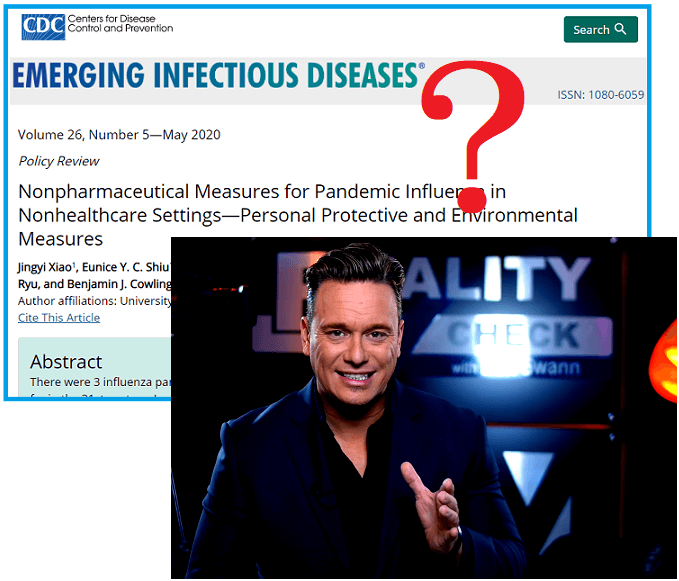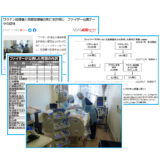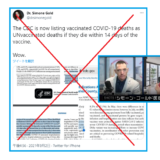デマの内容
2020年2月(5月更新)の CDC の発表を根拠として

CDC と WHO が、マスクに関する10件以上の RCT(ランダム化比較試験)をメタ解析したが、効果が無いという結論だった!
と主張する人がいますが、デマです。
結論
マスクに関する10件以上の RCT を調べた CDC の発表は、マスクが新型コロナの感染を防げないとは述べていません。
- この調査はインフルエンザについて行われたものであり、新型コロナについては言及されていません。
- 10件の RCT はパンデミック下に行われたものではないので信頼性が落ちます。
- 「マスクに感染を防ぐ効果があるという証拠が見つからなかった」ということが「マスクは感染を防ぐ効果がない」ということにはなりません。
- 調査を行った著者の一人は「マスクでは新型コロナの拡散を防げない」という主張は間違っていると述べました。
- CDC の発表からわずか数週間後、この調査のシニアオーサーと数人のコロナウイルス専門家のグループが、マスクが実際に非常に効果的であることを実証する論文を発表しました。
- この調査を実施したのは CDC でも WHO でもなく、香港大学です。
- 利用可能なデータは不完全であり、さらに研究が必要です。
- 調査対象の RCT は 1946年~2018 年のもので、CDC の発表が 2020 年の 2 月ですから、すでに古い情報です。(参考:マスクの効果があることを示す調査・研究の記事)
詳細
以下は POLITIFACT のファクトチェック(2020/7/31)です。
以下のファクトチェックでは、動画(2020/07/24)でデマが拡散されたケースを解説していますが、動画なしで(CDC の発表のみを根拠として)拡散されているパターンもあります。
No, a CDC-WHO study does not prove that masks do not prevent spread of COVID-19
いいえ、CDC と WHO の調査は、マスクで新型コロナの拡散を防げないとは言ってません
- The study was done on influenza, which spreads in ways similar to COVID-19, but it makes no mention of COVID-19.
この調査は、新型コロナと似た感染のしかたをするインフルエンザについて行われたものですが、新型コロナについては言及されていません。 - The study was published by the CDC and supported by WHO, but it was done by the University of Hong Kong.
この調査は CDC によって発表され、WHO によってサポートされましたが、調査を実施したのは香港大学です。 - One of the study’s authors told us the claim is incorrect.
調査を行った著者の一人は、この調査が、マスクで新型コロナの拡散を防げないことを示したという主張は間違っていると私たち(POLITIFACT)に言いました。
As Americans argue over whether face coverings stop the spread of COVID-19, a video shared on Facebook makes a stark claim about masks and viruses generally.
フェイスカバーが新型コロナの拡散を防ぐかどうかについてアメリカ人が議論している中、Facebookでシェアされた動画が、マスクとウイルスの全般についてあからさまな主張をしています。
A 2020 study from the U.S. Centers for Disease Control and Prevention and the World Health Organization, the video declares, “proves face masks do not prevent the spread of a virus.”
動画では、「2020年に発表された CDC(米国疾病予防管理センター)と WHO(世界保健機関)の調査によって、フェイスマスクではウイルスの拡散を防げないことが証明された」と主張しています。
The video was flagged as part of Facebook’s efforts to combat false news and misinformation on its News Feed. (Read more about our partnership with Facebook.)
Facebook のニュースフィード上の偽ニュースや誤報に対抗する取り組みの一環として、この動画にはフラグが立てられました。(Facebook とのパートナーシップについて詳しくはこちら)
One of the study’s authors, University of Hong Kong public health professor Ben Cowling, told PolitiFact that the claim amounts to an “incorrect interpretation” of the study, “confusing absence of evidence with evidence of absence.”
調査の著者の一人である香港大学の公衆衛生教授ベン・カウリングは、動画の主張は調査を誤って解釈しており「証拠の欠如と欠如の証拠を混同している(※)」とポリティファクトに語りました。(※感染を防ぐ証拠が見つからなかったということが、感染を防ぐことができないという証拠にはならない)
Virologist Angela Rasmussen, a research scientist at Columbia University, said of the study cited in the video: “The bottom line is that this paper doesn’t prove that face masks don’t prevent transmission, but that the available data didn’t show a statistically significant effect.
コロンビア大学の研究員でありウイルス学者のアンジェラ・ラスムセン氏は、ビデオに引用されている調査について次のように述べています。「要するに、この論文はフェイスマスクが感染を防げないことを証明するものではなく、入手可能なデータでは統計的に有意な効果が得られなかった、というだけです。」
“The available data is incomplete and more studies need to be done to better understand whether masks are effective at reducing community transmission or not. That is why I continue to wear a mask in public places.”
「利用可能なデータは不完全であり、マスクが市中感染を減らすのに有効かどうかをよりよく理解するためには、さらに研究が必要です。だから私は公共の場でマスクを着用し続けているのです。」
What’s known about masks
マスクについてわかっていること
As we’ve reported, facial coverings are not in themselves totally effective in fighting the coronavirus, and there is a need for more study. But health officials largely agree that wearing any kind of face mask, coupled with social distancing and frequent hand-washing, is more protective than going unmasked.
これまでお伝えしてきたように、顔を覆えばコロナウイルス対策として万全というわけではなく、さらなる研究が必要とされています。しかし、医療関係者の間では、どのような種類のフェイスマスクであっても、使用しないよりは予防効果が高いという意見が多いようです(ソーシャルディスタンスとこまめな手洗いも併用の上)。
The CDC generally recommends wearing masks in public settings where other social distancing measures are difficult to maintain, such as grocery stores, pharmacies, and gas stations.
CDC は一般的に、食料品店、薬局、ガソリンスタンドなど、ソーシャルディスタンスを保つことが難しい公共の場では、マスクの着用を推奨しています。
As the CDC puts it: “Your cloth face covering may protect them. Their cloth face covering may protect you.”
CDC は次のように述べています。「あなたの布製(※)フェイスカバーが周囲の人を守るかもしれない。周囲の人の布製フェイスカバーがあなたを守ってくれるかもしれません」。
※2021年9月現在、「布製」という表現は無くなっているようです。現在の日本では不織布マスクが推奨されています。
The video
動画の内容
The 15-minute video was narrated and posted by Ben Swann, who describes himself as a “journalist who speaks truth to power!” Swann, who has 486,000 Facebook followers, runs TruthInMedia.com, which says it provides “content focusing on issues that impact humanity.”
この15分間の動画は、自らを「権力に真実を語るジャーナリスト!」と称するベン・スワン氏がナレーションを担当し、投稿したものです。Facebook で48万6千人のフォロワーを持つスワン氏は、TruthInMedia.com を運営しており、「人類に影響を与える問題に焦点を当てたコンテンツ」を提供していると述べています。
The video was also shared the same day on YouTube by RT, a news network formerly known as Russia Today that is funded by the Russian Federation.
また、この動画は、同日、ロシア連邦が出資するニュースネットワーク「RT」(旧称:ロシア・トゥデイ)によって YouTube でシェアされました。
In February 2018, YouTube began labeling state-funded posts and videos promoting conspiracy theories. The step was significant, the Wall Street Journal reported at the time, in part because YouTube has been a major conduit for RT, “which U.S. intelligence officials called ‘the Kremlin’s principal international propaganda outlet.’”
2018年2月、YouTube は国家が出資した投稿や陰謀論を助長する動画にラベルを付け始めました。このステップが重要な理由の1つとして、YouTube が(米情報当局が『クレムリンの主要な国際的プロパガンダ吐き出し口』と呼んでいる)RT の主要な導管として使用されてきたという点が挙げられる、と当時のウォール・ストリート・ジャーナルは報じました。
CDC and WHO ties to the study
CDC/WHOと研究との関係
The study cited in the video was conducted by researchers at the University of Hong Kong — not by the CDC and WHO, as the video claims — although there are affiliations.
この動画で引用されている調査は、香港大学の研究者によって行われたものであり、動画で主張されているように CDC と WHO によるものではありません(提携関係はありますが)。
First published in February, the study appears in the May edition of Emerging Infectious Diseases, a peer-reviewed journal published by the CDC. The study says it was “conducted in preparation for the development of guidelines by the World Health Organization on the use of nonpharmaceutical interventions for pandemic influenza in nonmedical settings,” and was supported by the WHO.
この研究は(2020年の)2月に初めて発表され、CDC が発行する査読付き学術誌 Emerging Infectious Diseases の5月号に掲載されました。この研究は、「インフルエンザのパンデミック禍における医療機関外での非医薬品的介入(マスクなど)の適用について、WHO ガイドラインの作成準備のために実施されたもの」であり、WHO の支援を受けました。
The CDC confirmed it did not participate in the study and would not comment on it, but a spokesman cited a separate CDC study published in July. It looked at clients exposed to two hair stylists who were symptomatic with confirmed COVID-19. Among 139 clients who wore face masks while the stylists also wore face masks, there were no symptomatic secondary cases reported. Among 67 clients who tested for COVID-19, all test results were negative. “Adherence to the community’s and company’s face-covering policy likely mitigated spread of COVID-19,” the study said.
CDC はこの研究に参加しておらず、コメントを控えていますが、広報担当者は7月に発表された CDC の別の調査を引用しました。この調査では、新型コロナに感染していた2人のヘアスタイリストに接触した客を調べました。フェイスマスクを着用していた139人の客が、フェイスマスクを着用していたスタイリストに接触していましたが、症候性の二次感染は報告されませんでした。このうち、新型コロナの検査を受けた67人の客の検査結果はすべて陰性でした。「地域や店のフェイスカバーポリシーを守ったことで、新型コロナの拡散が軽減されたと考えられる」と研究結果は述べています。
WHO did not provide comment before we published.
WHOからのコメントはありませんでした。
The study cited in the video reviews flu research
動画で引用されている研究は、インフルエンザに関する調査です。
The study cited in Swann’s video amounts to a review of research on personal protective equipment and influenza spread. It does not mention coronavirus or COVID-19.
スワン氏の動画で引用されている研究は、個人用保護具とインフルエンザの感染拡大に関する研究調査です。コロナウイルスや新型コロナについては触れられていません。
After reviewing 10 studies on randomized and controlled trials that were published from 1946 to 2018, the study determined there was “no significant reduction in influenza transmission with the use of face masks.” That was regarding masks worn by infected persons or by persons in the general community.
この調査では、1946年から2018年までに発表された無作為化比較試験に関する10の研究を調べ、「フェイスマスクの使用によってインフルエンザの感染は有意に減少しなかった」と結論付けました。それは、感染者が着用するマスクや、一般市民が着用するマスクに関してでした。
“We did not find evidence that surgical-type face masks are effective in reducing laboratory-confirmed influenza transmission, either when worn by infected persons or by persons in the general community to reduce their susceptibility,” the researchers wrote. “However, as with hand hygiene, face masks might be able to reduce the transmission of other infections and therefore have value in an influenza pandemic when healthcare resources are stretched.”
「感染者がマスクを着用した場合も、感染拡大を抑えるために一般市民が着用した場合も、サージカルタイプのフェイスマスクが、研究室で確認されたインフルエンザの感染を減少させるという証拠は見つからなかった」と研究者は書いています。「しかし、手指衛生と同様に、フェイスマスクは他の感染症の感染を減少させることができるかもしれず、医療資源が不足しているインフルエンザのパンデミック時には価値があると考えられます」。
Cowling, one of the study’s authors, told us that because COVID-19 spreads in similar ways as to influenza, the study findings should apply to COVID-19.
この研究の著者の一人であるカウリング氏は、新型コロナはインフルエンザと似た方法で広がるため、この研究結果は新型コロナにも当てはまるはずだと話しています。
But University of San Francisco research scientist Jeremy Howard cautioned that influenza and COVID-19 are different diseases, “and we do not know whether evidence from influenza trials are relevant to COVID-19.”
しかし、サンフランシスコ大学の研究者であるジェレミー・ハワード氏は、インフルエンザと新型コロナは異なる疾患であり、「インフルエンザの臨床試験で得られたエビデンスが新型コロナに関連するかどうかはわからない」と注意を促しています。
The “we did not find evidence” phrase doesn’t prove either that masks are effective or ineffective, Howard said. He added that it’s important to note that none of the 10 trials reviewed was done during a pandemic.
ハワード氏は、「(マスクが有効だという)証拠は見つからなかった」という表現は、マスクが有効だとも無効だとも証明するものではないと述べています。さらに、調査された10件の臨床試験は、いずれも、パンデミック時に行われたものではないという点も重要だと付け加えています。
Rasmussen reiterated that “this was a systematic review of other published studies and it tells us much of what we already know: there’s not a good evidence base for masks outside of a healthcare setting, but there are still many knowledge gaps, especially regarding mechanisms of transmission.”
ラスムセン氏は、「今回の調査は、発表されている他の研究を系統的にレビューしたものであり、すでにわかっていることの多くを教えてくれています。医療現場以外でのマスクについては、十分なエビデンスがあるとはいえず、特に感染のメカニズムについては、まだ多くの知識のギャップがあります」と繰り返し述べています。
Texas A&M University-Texarkana virologist Ben Neuman said the study reflects the understanding of masks in the early phase of the pandemic, but scientific opinion has shifted because of several important papers published since then.
テキサス A&M 大学・テクサーカナのウイルス学者ベン・ニューマン氏は、今回の研究はパンデミックの初期段階におけるマスクについての理解を反映したものであるが、その後に発表されたいくつかの重要な論文により、科学的見解が変化したと述べています。
“The kicker is,” he added, “just weeks later, a group with the same senior author, plus some coronavirus specialists, produced a paper demonstrating that masks are indeed highly effective in stopping infected people from releasing airborne viruses.”
「CDC の調査からわずか数週間後、その調査のシニアオーサーと数人のコロナウイルス専門家のグループによって、感染者の空気中へのウイルス排出を防ぐ手段としてマスクが実際に非常に効果的であることを実証する論文が発表されたのです。」
The post claims a CDC study proved that masks do not prevent COVID-19. But it wasn’t a CDC study, and it didn’t “prove” that masks were ineffective. Scientists are still studying masks and the prevention of COVID-19. We rate the statement False.
SNS の投稿は、マスクでは新型コロナを防げないことが CDC の研究で証明された、と主張しています。しかし、これは CDC の研究ではありません。そして、マスクは効果がないという「証明」はされていません。科学者たちは、マスクと新型コロナの予防について研究を続けています。私たちはこの SNS の主張を「誤り」と評価します。
 ほえのブログ
ほえのブログ 

